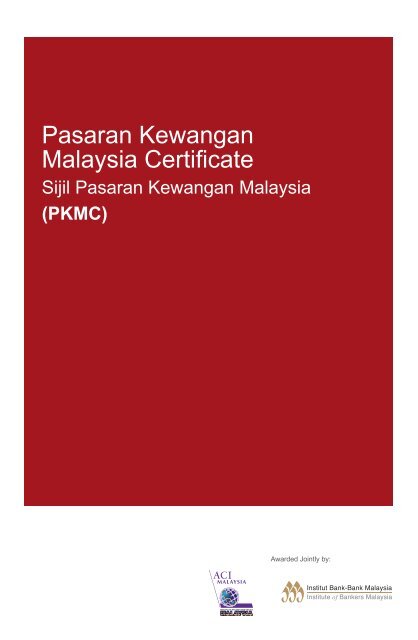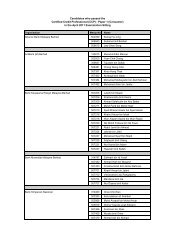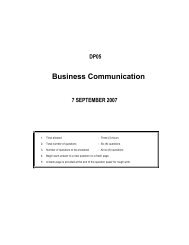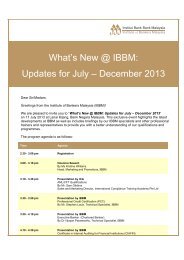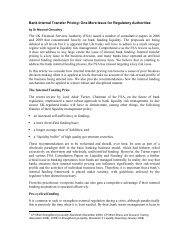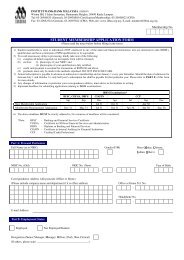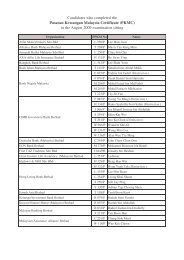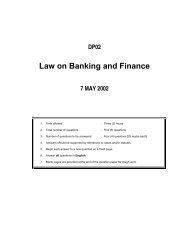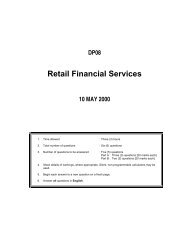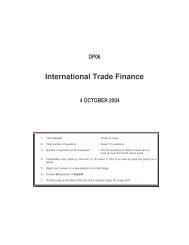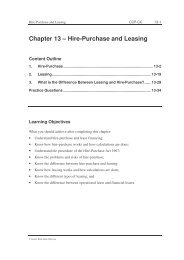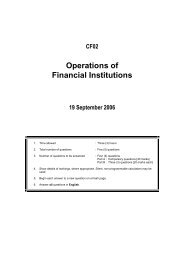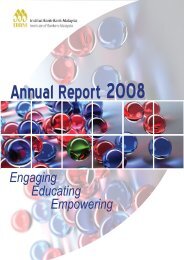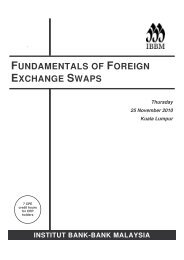Pasaran Kewangan Malaysia Certificate - Institute of Bankers Malaysia
Pasaran Kewangan Malaysia Certificate - Institute of Bankers Malaysia
Pasaran Kewangan Malaysia Certificate - Institute of Bankers Malaysia
Create successful ePaper yourself
Turn your PDF publications into a flip-book with our unique Google optimized e-Paper software.
<strong>Pasaran</strong> <strong>Kewangan</strong><br />
<strong>Malaysia</strong> <strong>Certificate</strong><br />
Sijil <strong>Pasaran</strong> <strong>Kewangan</strong> <strong>Malaysia</strong><br />
(PKMC)<br />
Awarded Jointly by:
14 I <strong>Pasaran</strong> <strong>Kewangan</strong> <strong>Malaysia</strong> <strong>Certificate</strong> (PKMC)<br />
Corporate Information<br />
INSTITUTE OF BANKERS MALAYSIA<br />
(IBBM)<br />
PERSATUAN PASARAN KEWANGAN<br />
MALAYSIA (PPKM)<br />
Established as the pr<strong>of</strong>essional and educational<br />
body for the banking and financial services<br />
industry in <strong>Malaysia</strong>, IBBM is committed to assist<br />
financial institutions empower their employees<br />
with new knowledge and skills to achieve business<br />
goals. To meet this objective, IBBM has formed<br />
strategic partnerships with renowned business<br />
schools, universities, pr<strong>of</strong>essional institutes,<br />
industry leaders, and specialised agencies to<br />
facilitate the transfer <strong>of</strong> international best practices<br />
and knowledge.<br />
As the industry’s leading training provider, IBBM<br />
works closely with financial institutions to design,<br />
develop and deliver continuing pr<strong>of</strong>essional<br />
development programmes covering all aspects <strong>of</strong><br />
domestic and international banking.<br />
Certification is an effective aid to career<br />
development, providing formal recognition <strong>of</strong> both<br />
competency and capability. IBBM <strong>of</strong>fers industry<br />
focused pr<strong>of</strong>essional certification both through its<br />
own curriculum and awards, and in collaboration<br />
with other educational institutions.<br />
IBBM disseminates information on banking and<br />
financial services via both print and electronic<br />
media, including the internet. Among the products<br />
are the Banker’s Journal <strong>Malaysia</strong>, a bi-monthly<br />
newsletter, study materials, online resources, selflearning<br />
CD-ROM packages, and general<br />
reference and training materials.<br />
Our mission is to be a pr<strong>of</strong>essional training adviser<br />
and provider in developing practitioners <strong>of</strong> the<br />
banking and financial services industry to enable<br />
them to function effectively in an evolving financial<br />
services environment.<br />
Persatuan <strong>Pasaran</strong> <strong>Kewangan</strong> <strong>Malaysia</strong> (PPKM)<br />
(ACI-<strong>Malaysia</strong>) was established in 1974 with the<br />
objective <strong>of</strong> providing an association for those<br />
who are actively engaged in the wholesale foreign<br />
exchange and money market in <strong>Malaysia</strong>. Besides<br />
<strong>of</strong>fering a platform for social and friendly contact<br />
among its members, PPKM is also actively<br />
involved in education to develop and enhance the<br />
knowledge and skills <strong>of</strong> members. PPKM has six<br />
categories <strong>of</strong> membership: Provisional, Broker,<br />
Affiliate, Ordinary, International and Associate and<br />
may invite any person to become an Honorary<br />
Member.<br />
In its effort to upgrade members’ knowledge and<br />
skills, PPKM has, since December 1995, imposed<br />
qualifying examinations for its new members.<br />
Members must now pass the four modules <strong>of</strong><br />
the Sijil <strong>Pasaran</strong> <strong>Kewangan</strong> <strong>Malaysia</strong> (<strong>Malaysia</strong>n<br />
Financial Markets <strong>Certificate</strong>/PKMC)<br />
before they are licensed to participate in<br />
the interbank foreign exchange and money<br />
market. PPKM also organises talks, seminars,<br />
conferences, meetings and related gatherings for<br />
its members and the general public to improve and<br />
update their knowledge.<br />
The other main objective <strong>of</strong> PPKM is to constantly<br />
review the techniques and practices in the forex<br />
and money markets in order to develop, improve<br />
and maintain high standards comparable to<br />
international practices and techniques. It also<br />
liases and seeks affiliation with associations and<br />
bodies in foreign countries with similar objectives<br />
and participates in international forums related to<br />
the foreign exchange and money market.<br />
The world is changing, and for those who embrace<br />
change, lifelong learning ensures there is no limit<br />
to what they can accomplish. IBBM is here to<br />
enable banking and financial services practitioners<br />
to continuously build their competencies and to<br />
accelerate the pr<strong>of</strong>essional development <strong>of</strong> those<br />
who take the initiative.<br />
<strong>Institute</strong> <strong>of</strong> <strong>Bankers</strong> <strong>Malaysia</strong><br />
Wisma IBI, 5 Jalan Semantan,<br />
Damansara Heights,<br />
50490 Kuala Lumpur, <strong>Malaysia</strong><br />
T : 603-2093 8803<br />
F : 603-2095 2322<br />
W : www.ibbm.org.my<br />
E : certication@ibbm.org.my<br />
Persatuan <strong>Pasaran</strong> <strong>Kewangan</strong> <strong>Malaysia</strong><br />
18, Lorong 6A/91,<br />
Taman Shamelin Perkasa<br />
56100 Kuala Lumpur, <strong>Malaysia</strong><br />
T : 603-9282 0728/9282 3728<br />
F : 603-9282 3616<br />
W : www.ppkm.net<br />
E : seccom33@streamyx.com
<strong>Pasaran</strong> <strong>Kewangan</strong> <strong>Malaysia</strong> <strong>Certificate</strong> (PKMC) I 15<br />
General Information<br />
Introduction<br />
The <strong>Pasaran</strong> <strong>Kewangan</strong> <strong>Malaysia</strong> <strong>Certificate</strong> (PKMC) is the pr<strong>of</strong>essional<br />
requirement set by Persatuan <strong>Pasaran</strong> <strong>Kewangan</strong> <strong>Malaysia</strong> (PPKM) for its<br />
Provisional, Provisional Broker or Affiliate Members to upgrade to Ordinary,<br />
Broker or Associate Members. This <strong>Certificate</strong> is jointly awarded by PPKM and<br />
IBBM and aims to ensure that the <strong>Malaysia</strong>n wholesale financial markets will<br />
continue to uphold the highest standards <strong>of</strong> pr<strong>of</strong>essionalism and integrity, and<br />
grow in an orderly manner.<br />
Objectives<br />
To equip dealers and brokers with knowledge and understanding <strong>of</strong> the:<br />
• <strong>Malaysia</strong>n financial system and markets<br />
• <strong>Malaysia</strong>n Code <strong>of</strong> Conduct and Market Practices<br />
• forex and money market operations in <strong>Malaysia</strong><br />
• basic calculations used in forex and money market operations<br />
• risks in forex, money market operations and basic derivatives, and how to<br />
manage these risks<br />
Eligibility<br />
Candidates registering for the PKMC examinations must first be accepted as<br />
Provisional, Provisional Broker or Affiliate Members <strong>of</strong> PPKM.<br />
Course<br />
<strong>of</strong> Study<br />
The course <strong>of</strong> study comprises four modules, namely:<br />
Module I<br />
Module II<br />
The Money<br />
Market<br />
Module III<br />
The Foreign<br />
Exchange<br />
Market<br />
Module IV<br />
Risk<br />
Management<br />
and Basic<br />
Derivatives<br />
Part A :<br />
The <strong>Malaysia</strong>n Code<br />
<strong>of</strong> Conduct and<br />
Market<br />
Practices<br />
Part B :<br />
The <strong>Malaysia</strong>n<br />
Financial System and<br />
Conduct <strong>of</strong><br />
Monetary Policy<br />
Assessment<br />
Structure<br />
Module I<br />
80 multiple choice questions conducted<br />
over 1½ hours<br />
Modules II, III and IV<br />
40 multiple choice questions and<br />
3 compulsory essay questions<br />
conducted over 2 hours per module<br />
Passing mark for each module: 75%<br />
IMPORTANT:<br />
• Module I must be attempted at the first examination sitting. If a candidate fails<br />
to pass Module I at the first sitting, Module I must be included as one <strong>of</strong> the<br />
papers to be examined in subsequent examination sitting(s).
16 I <strong>Pasaran</strong> <strong>Kewangan</strong> <strong>Malaysia</strong> <strong>Certificate</strong> (PKMC)<br />
Preparation<br />
for<br />
Examinations<br />
It is mandatory for all new candidates who register for the examinations for<br />
the first time to attend and complete a series <strong>of</strong> structured instructor-led-induction<br />
day-seminars on the four modules in preparation for the examinations.<br />
Module I<br />
2 days<br />
Modules II, III and IV<br />
4 days per module<br />
Please visit www.ibbm.org.my for the induction seminars’ schedule.<br />
Frequency <strong>of</strong><br />
Examinations<br />
Time Limit<br />
Examinations will be held three times a year. The examination schedule will be<br />
published in IBBM’s newsletter and website. Candidates are responsible for<br />
looking up this information on their own.<br />
A candidate will be allowed to register for one or more modules for each<br />
examination sitting.<br />
Provisional and Affiliate Members will have to pass all four modules within six<br />
consecutive examination sittings (one exam cycle), failing which, the passes<br />
cumulated in each exam cycle will be nullified. The candidate will then be required<br />
to immediately the next without any lapse Should the<br />
candidate fail the examination within two (2) cycles, the candidate will be<br />
de-registered by PPKM.<br />
Provisional Broker Member will have to pass Module 1 within six consecutive<br />
examination sittings (one exam cycle), failing which the candidate will be<br />
de-registered by PPKM.<br />
Induction Seminars and Examination Enrolment<br />
Enrolment<br />
Schedule<br />
Candidates are required to submit their registration for the mandatory induction<br />
seminars and examination entries according to the schedule in IBBM’s website.<br />
Induction<br />
Seminar Fee<br />
Module I<br />
RM400<br />
Modules II, III<br />
and IV<br />
RM800 per module<br />
All four modules<br />
RM2,700<br />
Examination<br />
Fee<br />
RM150 per module for the first examination sitting.<br />
RM100 per referred module.<br />
Examination<br />
Attendance<br />
and Result<br />
Notices<br />
Attendance Notices will be posted<br />
to candidates two weeks before the<br />
examination date. Candidates will not<br />
be allowed to sit for the examinations<br />
without their attendance notices.<br />
Please contact the <strong>Institute</strong> for<br />
assistance if you do not receive your<br />
Attendance Notice one week before<br />
the examinations.<br />
Result Notices will be posted to<br />
all candidates eight weeks after<br />
the examinations and the list <strong>of</strong><br />
completing candidates will be posted<br />
on our website. For confidentiality<br />
reasons, results will NOT be given by<br />
telephone, fax or email.<br />
Results are expressed in grade bands. Each grade band represents a range <strong>of</strong><br />
marks.
<strong>Pasaran</strong> <strong>Kewangan</strong> <strong>Malaysia</strong> <strong>Certificate</strong> (PKMC) I 17<br />
Non<br />
Attendance<br />
For the induction seminar<br />
Subject to the conditions stated below, full attendance for all four modules <strong>of</strong> the<br />
induction seminars are COMPULSORY, failing which a new candidate will NOT<br />
be allowed to sit for any examination papers.<br />
• For each module, a new candidate may NOT be absent for more than 25% <strong>of</strong><br />
the duration <strong>of</strong> the seminar allocated for that module, and<br />
• The candidate may NOT be absent for more than a total <strong>of</strong> two days for the<br />
whole duration <strong>of</strong> the seminars conducted for all four modules.<br />
The candidate MUST produce a letter from his/her employer giving reasons for<br />
his/her absence within one week after each induction seminar.<br />
For the examination<br />
Nonattendance in examination will be considered as a missed exam sitting.<br />
Changes,<br />
Withdrawal,<br />
Deferment<br />
and Transfer<br />
Changes<br />
anges in a candidate’s entry details for the induction seminars and<br />
examinations will be accepted after their respective closing dates.<br />
Candidates must ensure that their details are correct before submission<br />
to IBBM for registration.<br />
Withdrawal<br />
Withdrawal from the induction seminars and examinations must be made in<br />
writing and submitted to IBBM before respective closing dates.<br />
Deferment<br />
Deferment <strong>of</strong> induction seminars and/or examinations must be made in writing<br />
and submitted to IBBM before the respective registration closing dates.<br />
Transfer<br />
If a candidate is unable to attend any part <strong>of</strong> the examination because <strong>of</strong> illness,<br />
a written application must be submitted together with medical evidence no later<br />
than two weeks after the examination.<br />
An application approved for transfer <strong>of</strong> examination entries due to medical reason<br />
is subject to a fee <strong>of</strong> RM50 per module.<br />
Candidates can request to either defer or transfer their examination entry only<br />
once to the immediate sitting.<br />
Refund Policy<br />
A refund not exceeding 50% <strong>of</strong> the fee may be<br />
the registration closing date.<br />
A request for refund must be made in writing and will be treated on a caseby-case<br />
basis. Such cases may include resignations from the organisation, or<br />
transfers to a non-forex department.<br />
A 50% refund <strong>of</strong> the fees for the induction seminar will be made to those who<br />
were absent throughout the entire duration <strong>of</strong> the induction seminar due to serious<br />
medical reasons.<br />
All requests for refund must be submitted within two weeks after the last<br />
module <strong>of</strong> the seminar.
18 I <strong>Pasaran</strong> <strong>Kewangan</strong> <strong>Malaysia</strong> <strong>Certificate</strong> (PKMC)<br />
Important Notes to Candidates<br />
• The PKMC Examination Committee, comprising senior members <strong>of</strong> the PPKM, is responsible for<br />
all matters relating to the PKMC study and examination programme. The Committee will review the<br />
examination results and the decision <strong>of</strong> the Committee on the results will be final. All appeals<br />
will NOT be considered and PPKM and IBBM will not enter into any correspondence regarding<br />
review <strong>of</strong> examination results.<br />
• PPKM and IBBM take an extremely serious view <strong>of</strong> any form <strong>of</strong> misconduct in the<br />
examination. Any complaint will be referred to the PPKM and investigated by PPKM and IBBM.<br />
If guilt is established, the candidate will be liable for disciplinary action.<br />
Misconduct includes any forms <strong>of</strong> misbehaviour during the examinations, acting contrary to<br />
the instructions given by invigilators and the rules governing the conduct <strong>of</strong> candidates at the<br />
examinations.<br />
• Candidates are advised to read PPKM’s and IBBM’s newsletter and check PPKM’s and IBBM’s<br />
website for updates on the examination syllabus, changes to the examination dates, rules and<br />
procedures.<br />
How is the PKMC Awarded?<br />
• A <strong>Certificate</strong> with Distinction will be awarded to any candidate who passes all four modules in the<br />
first sitting <strong>of</strong> the examinations (within the first validity cycle) with a minimum score <strong>of</strong> 85% for each<br />
module.<br />
• A <strong>Certificate</strong> with Pass will be awarded to any candidate who passes all four modules and falls<br />
outside the Distinction category.<br />
Prizes for Outstanding Performance<br />
• ach year, a prize will be awarded for each module to the candidate who achieves the highest<br />
mark on his/her first examination sitting and the mark must be 90% or above.<br />
• ach year, a prize will be awarded to the candidate who completes the PKMC examinations in<br />
one and the first sitting and achieves the highest aggregate mark for all the modules with a minimum<br />
<strong>of</strong> 90% for each <strong>of</strong> the modules.<br />
Disclaimer<br />
• IBBM reserves the right to amend a member’s examination status to take cognisance <strong>of</strong> any changes or<br />
revision in the examination structure and syllabus.<br />
• In the event that IBBM is unable to hold any <strong>of</strong> its scheduled examinations or that a candidate’s answer<br />
sheet is lost or destroyed, for reasons beyond its control, IBBM’s liability shall be limited to a refund <strong>of</strong> the<br />
examination fees paid.<br />
• The information contained in this brochure is correct at the time <strong>of</strong> compilation. The <strong>Institute</strong> reserves the<br />
right to make alterations without notice to the material contained and described in this brochure.
<strong>Pasaran</strong> <strong>Kewangan</strong> <strong>Malaysia</strong> <strong>Certificate</strong> (PKMC) I 19<br />
Syllabus<br />
Module I<br />
Part A:<br />
The <strong>Malaysia</strong>n Code <strong>of</strong> Conduct and<br />
Market Practices (70%)<br />
1. The International Code <strong>of</strong> Conduct and<br />
Practice for the Financial Markets<br />
(The Model Code), read together with the<br />
Local Addendum (re: PPKM’s letter dated<br />
May 17, 2002)<br />
1.1 Business hours and time zone related<br />
1.2 Personal conduct issues<br />
1.3 Back <strong>of</strong>fice, payments and confirmations<br />
1.4 Disputes, differences, mediation and<br />
compliance<br />
1.5 Authorisation, documentation and<br />
telephone taping<br />
1.6 Brokers and brokerage<br />
1.7 Dealing practice<br />
1.8 Dealing practice for specific transactions<br />
1.9 General risk management principles for<br />
dealing business<br />
1.10 Additional guidelines for dealing with<br />
corporate/commercial clients<br />
1.11 Market terminology<br />
2. Rules on the Scripless Securities Under the<br />
Real Time Electronic Transfer <strong>of</strong> Funds and<br />
Securities (RENTAS) System<br />
2.1 Issuing procedures for SSTS securities<br />
2.2 Holiday convention<br />
2.3 Roles <strong>of</strong> principal dealers, authorised<br />
depository institution, approved interbank<br />
institution<br />
2.4 Trading principles and procedures for<br />
secondary market<br />
2.5 Settlement principles and procedures for<br />
delayed or failed settlement <strong>of</strong> securities<br />
transactions<br />
3. Rules on Fully Automated System for Issuing/<br />
Tendering (FAST)<br />
3.1 Types <strong>of</strong> instruments and users <strong>of</strong> FAST<br />
3.2 Issuing procedure for securities<br />
3.3 Issuing procedure for money market<br />
tender<br />
3.4 FAST automated repo system<br />
Part B:<br />
The <strong>Malaysia</strong>n Financial System and<br />
Conduct <strong>of</strong> Monetary Policy (30%)<br />
5. The Banking System<br />
5.1 Brief history <strong>of</strong> the <strong>Malaysia</strong>n financial<br />
system<br />
5.2 Process <strong>of</strong> financial intermediation<br />
5.3 Introduction to the Banking and Financial<br />
Institutions Act 1989 (BAFIA)<br />
6. Functions and Responsibilities <strong>of</strong> the Banking<br />
System – Financial Institutions<br />
6.1 Bank Negara <strong>Malaysia</strong><br />
6.2 Commercial banks<br />
6.3 Islamic banks<br />
6.4 Finance companies<br />
6.5 Merchant banks<br />
6.6 Discount houses<br />
6.7 Labuan <strong>of</strong>fshore banks<br />
7. Functions and Responsibilities <strong>of</strong> Non-Bank<br />
Financial Intermediaries<br />
7.1 Insurance companies<br />
7.2 Development finance institutions<br />
7.3 Savings institutions<br />
7.4 Unit trusts<br />
7.5 Housing credit institutions<br />
7.6 Cagamas Berhad<br />
7.7 Leasing companies<br />
8. Overview <strong>of</strong> the Financial Market<br />
8.1 Interbank market<br />
8.2 Foreign exchange market<br />
8.3 Capital market<br />
8.4 Derivatives market<br />
9. BNM’s Conduct <strong>of</strong> Monetary Policy<br />
9.1 Objective <strong>of</strong> monetary policy<br />
9.2 Monetary instruments<br />
9.3 Liquidity operations<br />
(Conventional and Islamic)<br />
9.4 Tactical Implementation<br />
4. Rules on Bond Information and Dissemination<br />
System (BIDS)<br />
4.1 Trading principles and procedures for<br />
secondary market<br />
4.2 Deal information<br />
4.3 Code <strong>of</strong> ethics
20 I <strong>Pasaran</strong> <strong>Kewangan</strong> <strong>Malaysia</strong> <strong>Certificate</strong> (PKMC)<br />
Syllabus<br />
Module II<br />
THE MONEY MARKET<br />
1. Overview <strong>of</strong> Financial Markets<br />
1.1 Definition <strong>of</strong> market and basic<br />
components<br />
1.2 Financial markets, structure, players and<br />
globality<br />
1.3 Financial transactions, execution modes<br />
and types<br />
2. The Money Markets<br />
2.1 Flow <strong>of</strong> funds in the economy<br />
2.2 Functions <strong>of</strong> money market<br />
2.3 <strong>Malaysia</strong>n money market structure<br />
2.4 Treasury money market products and<br />
management<br />
2.5 Bank Negara <strong>Malaysia</strong> accounts and<br />
clearing settlement<br />
2.6 International money markets<br />
3. Basic Financial Calculations<br />
3.1 Simple interest<br />
3.2 Present value at simple interest<br />
3.3 Simple discount<br />
3.4 Relationship between simple interest and<br />
simple discount<br />
3.5 365 and 360 days year<br />
3.6 Compound interest<br />
3.7 Nominal versus effective interest rates<br />
4. The Cash Market<br />
4.1 Role and functions <strong>of</strong> the cash market<br />
4.2 Interbank money, deposits market<br />
4.3 Kuala Lumpur interbank <strong>of</strong>fer rate<br />
(KLIBOR)<br />
4.4 Factors affecting interest rates<br />
5. Money Market Instruments<br />
Definition, primary purpose, primary issuer,<br />
features (e.g. amount, tenor, types, settlement<br />
and delivery, pricing, redemption, bands,<br />
proceeds and yield) and computation for each<br />
<strong>of</strong> the following instruments:<br />
5.1 <strong>Bankers</strong> acceptances<br />
5.2 <strong>Malaysia</strong>n Government treasury bills and<br />
Bank Negara <strong>Malaysia</strong> bills<br />
5.3 <strong>Malaysia</strong>n Government securities and<br />
semi-Government securities<br />
5.4 Cagamas securities: notes and bonds<br />
5.5 Private debt securities<br />
5.6 Negotiable instruments <strong>of</strong> deposit<br />
5.7 Repurchase mechanism<br />
5.8 Khazanah, Danaharta, Danamodal<br />
6. Reserve and Liquidity Requirements<br />
6.1 Purpose <strong>of</strong> bank reserves<br />
6.2 Concept and component <strong>of</strong> eligible<br />
liabilities<br />
6.3 Statutory reserve requirement<br />
6.4 New liquidity reserve requirement<br />
7. Computation <strong>of</strong> Base Lending Rate<br />
7.1 Computed and quoted base lending rate<br />
8. Computation <strong>of</strong> Cost <strong>of</strong> Funds<br />
8.1 Historical cost approach<br />
8.2 Marginal cost approach<br />
8.3 Reserve cost<br />
8.4 Break-even rate<br />
9. Money Market Management and Strategies<br />
9.1 Yield curves<br />
9.2 Gapping<br />
10. Introduction to Islamic Money Market<br />
10.1 General overview on the framework <strong>of</strong><br />
Islamic banking<br />
10.2 Islamic banking concept and Islamic<br />
banking products<br />
10.3 Islamic money market<br />
10.4 Treasury operation under Islamic<br />
banking
<strong>Pasaran</strong> <strong>Kewangan</strong> <strong>Malaysia</strong> <strong>Certificate</strong> (PKMC) I 21<br />
Syllabus<br />
Module III<br />
THE FOREIGN EXCHANGE MARKET<br />
1. Introduction to Foreign Exchange (FX)<br />
1.1 What is FX and the need for FX<br />
1.2 Features and participants<br />
1.3 Factors affecting FX rates<br />
1.4 Types <strong>of</strong> FX transactions and dealing<br />
modes<br />
1.5 Types <strong>of</strong> dealers and FX positions<br />
1.6 Common dealing terminology and trading<br />
mistakes<br />
1.7 Various FX regimes<br />
1.8 Historical overview and recent<br />
developments in the FX market<br />
1.9 Overview <strong>of</strong> the <strong>Malaysia</strong>n FX market<br />
1.10 Global market practices for FX<br />
2. Role <strong>of</strong> Central Bank Intervention in Currency<br />
Markets<br />
2.1 Traditional role <strong>of</strong> central banks<br />
2.2 Reasons for FX intervention<br />
2.3 Types <strong>of</strong> FX intervention<br />
2.4 Spot versus forward FX intervention<br />
6. The Forward and Swap Market<br />
6.1 Definition, features and uses <strong>of</strong> FX<br />
swaps<br />
6.2 Mechanics and interpretation <strong>of</strong> swap<br />
points<br />
6.3 Factors affecting swap points<br />
6.4 Calculation <strong>of</strong> swap points<br />
6.5 Calculation <strong>of</strong> FX swap funding cost<br />
6.6 Determining cost and pricing <strong>of</strong> “Earlytake-ups”,extensions<br />
and cancellation <strong>of</strong><br />
FX contracts<br />
7. Technical Analysis<br />
7.1 Technical analysis as trading tools<br />
versus fundamental analysis<br />
7.2 Basic premises <strong>of</strong> technical analysis<br />
7.3 Charting techniques/tools<br />
7.4 Trend analysis and interpretation <strong>of</strong> chart<br />
formation and pattern<br />
3. Risks in Foreign Exchange<br />
3.1 FX exposure risks<br />
3.2 FX transactional risks<br />
3.3 Hedging strategies<br />
4. Foreign Exchange Mechanics and Applications<br />
4.1 Details <strong>of</strong> a typical spot FX transaction<br />
4.2 Interpretation <strong>of</strong> FX quotations and<br />
points<br />
4.3 Types <strong>of</strong> FX quotations<br />
4.4 Value dates<br />
4.5 Types <strong>of</strong> FX contracts<br />
5. Foreign Exchange Mathematics and<br />
Application<br />
5.1 Calculation <strong>of</strong> various types <strong>of</strong> cross<br />
rates<br />
5.2 Principles and calculation <strong>of</strong> counter rate<br />
for customers<br />
5.3 Calculation for various value dates<br />
5.4 Calculation for option and multiple option<br />
deliveries<br />
5.5 Calculation <strong>of</strong> pr<strong>of</strong>it and loss<br />
5.6 “Stop-loss” and “take-pr<strong>of</strong>it” strategies<br />
and calculations
22 I <strong>Pasaran</strong> <strong>Kewangan</strong> <strong>Malaysia</strong> <strong>Certificate</strong> (PKMC)<br />
Syllabus<br />
Module IV<br />
RISK MANAGEMENT and BASIC DERIVATIVES<br />
1. Introduction to Risk Management<br />
1.1 Reasons and requirement for risk<br />
management<br />
1.2 Management objectives<br />
1.3 Types <strong>of</strong> products at risk<br />
2. Major Types <strong>of</strong> Risk – Definition and Concepts<br />
<strong>of</strong>:<br />
2.1 Market or price risk<br />
2.2 Credit risk<br />
2.3 Liquidity risk<br />
2.4 Operations risk<br />
2.5 Legal risk<br />
3. Foreign Exchange Risk (Causes, Risk<br />
Management, Risk Measurement and Control)<br />
3.1 Market risk<br />
3.2 Credit risk<br />
3.3 Liquidity risk<br />
3.4 Operations risk<br />
3.5 Legal risk<br />
6. Review <strong>of</strong> Some Market Concepts<br />
6.1 Main features <strong>of</strong> treasury instruments<br />
6.2 Basic understanding <strong>of</strong> cash<br />
transactions, on-balance sheet and <strong>of</strong>fbalance<br />
sheet transactions<br />
6.3 Basic understanding <strong>of</strong> exchange traded<br />
products (ETP) versus over-the-counter<br />
products (OTP)<br />
6.4 Understanding <strong>of</strong> forward/forward and<br />
interest rate risks<br />
7. Products – FX and Interest Rate Derivatives<br />
Definition, main features, uses, mechanics,<br />
application and computation<br />
7.1 Currency futures<br />
7.2 Currency options<br />
7.3 Non-deliverable forwards<br />
7.4 Forward rate agreements<br />
7.5 Interest rate swaps<br />
7.6 Financial futures<br />
7.7 Financial options<br />
4. Interest Rate Risk (Causes, Risk Management,<br />
Risk Measurement and Control)<br />
4.1 Market risk<br />
4.2 Credit risk<br />
4.3 Liquidity risk<br />
4.4 Operations risk<br />
4.5 Legal risk<br />
5. Introduction to Basic Derivatives<br />
5.1 Definition <strong>of</strong> derivatives<br />
5.2 Users and uses<br />
5.3 Major risks associated with derivatives


